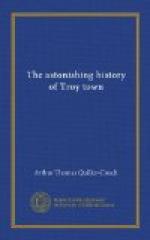“I mou’t,” admitted Peter slowly.
“I ask you, then, if Tamsin has your leave to make me happy. Knowing what it costs you—”
“No cost, sir, where our little maid’s happiness es consarned. Tamsin knaws that, but ’t ‘as been the harder to talk wi’ her as us shud ha’ wished, an’ that there’s no denyin’. Us knawed all along she’d be leavin’ us some day, an’ oft’n Paul an’ me have a-made up each other’s mind to ’t. I misdoubts, sir—I misdoubts sorely— seein’ ‘tes you her heart es set to marry—meanin’ no offence, sir. But as ’tes set—Tamsin, girl, we’ll be goin’, I reckon. I’m thinkin’ I’ve a-parted wi’ enough o’ my heart’s blud for wan night.”
He moved towards the door, but came back again to shake hands, with a word of self-reproach for his lack of courtesy. Then, with a tenderness almost motherly on his mahogany face—
“Be gentle wi’ her,” he said. “She’s quick to larn—an’ takes cold aisy, which, ef seen to early, a little nitre will a’most al’ays pervent. Come ’long, Tamsin.”
CHAPTER XXV.
WHICH ENDS THE STORY OF TROY.
The wedding took place in less than two months after Mr. Fogo’s dinner-party. A longer interval would have proved, I believe, fatal to both Peter and Paul, who wore themselves thin over small anxieties, from the trousseau to the cake.
Three days before the wedding, for instance, they rowed down to Kit’s House and awoke Caleb at 4.30 a.m. by throwing gravel against his window.
“Oh, ’tes you,” said Caleb, as he thrust open the lattice; “what’s amiss now?”
“We have been considerin’ which of us two es to gi’e Tamsin away.”
“Toss up.”
“We have tossed up—scores o’ times.”
“Well?”
“The results,” said Peter gravely, “es versified.”
“What?”
“Otherwise, various. The results es various—inclinin’ to Paul.”
“Well, let Paul do it.”
“Peter es oulder,” objected Paul.
“By dree minnits—which don’t fairly count,” put in Peter.
“Peter,” observed Caleb, “looks th’ oulder—by full dree minnits.”
“Paul went to school afore me,” said Peter, “by two days—along o’ measles.”
“Look ‘ere,” decided Caleb, “let Paul gi’e her away, an’ you, bein’ the better spokesman, can propose th’ health o’ the bride an’ bridegroom.”
This satisfied them, and so it was arranged at the wedding. I am not going to describe the ceremony—at which I had the privilege of holding my friend’s hat—beyond saying that woman, as is usual on these occasions, was a success, and man a dismal failure. There was one exception. When little Susie Clemow, who at Mr. Fogo’s express desire was one of the bridesmaids, identified the bridegroom with the strange gentleman who had frightened her in the lane, and burst into loud screams in the middle of the service, I could not sufficiently admire the readiness with which Peter Dearlove produced a packet of brandy-balls from his tail-pocket to comfort her, or the prescience which led him to bring such confectionery to a wedding.




